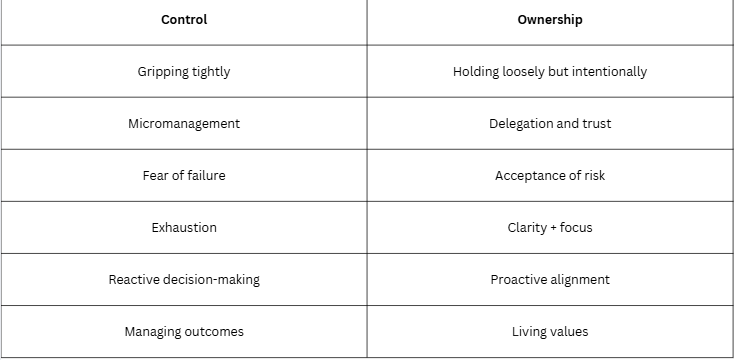The Cost of Control vs. Power of Ownership
The Cost of Control vs. Power of Ownership
He had a team. A strong one.
The business was humming, the revenue consistent, the clients happy.
But he couldn’t step away—not even for a weekend.
“If I’m not watching it all,” he told me, “I feel like it might slip.”
He wasn’t wrong. Things might slip.
But what he couldn’t see was the bigger cost:
His entire life was slipping through the cracks.
That’s the hidden price of control—on the surface, everything looks smooth.
But underneath? You’re exhausted.
You’re not running a business. You’re containing one.
You’re not leading a team. You’re managing a mirage of certainty.
Another client once told me she felt like the CFO of her own family.
Not a partner. Not a mother. A spreadsheet with legs.
“I make sure the college accounts are maxed. I pay the bills, I rebalance our portfolios. I even pick out the vacation destinations. But I couldn’t tell you the last time I felt present on one or enjoyed it without thinking about money.”
She wasn’t being selfish. She was being responsible.
But control disguised as responsibility eventually turns intimacy into obligation.
The more she controlled the financial levers of the household, the more disconnected she became from the people inside it.
She wasn’t the glue holding it together.
She was the gatekeeper keeping herself out.
And what’s worse?
She was starting to forget what it felt like to be let in.
That’s the hidden price of control—on the surface, everything looks smooth.
But underneath? You’re exhausted.
You’re not leading your family. You’re managing outcomes.
These aren’t stories of failure.
They’re stories of fear.
And fear almost always shows up dressed as control.
The Seduction of Control
Control is intoxicating.
It makes you feel safe. Responsible. Even powerful.
But underneath? It’s often driven by fear.
Fear of losing what you’ve built.
Fear of being exposed as not knowing what to do next.
Fear of trusting others—because you’ve been burned before.
Fear that if you let go, everything will fall apart…
Or worse—someone might realize you’re not actually needed for everything.
So you stay in control.
You say it’s about protecting your business, your family, your wealth.
But really? It’s about protecting your identity.
And that’s the problem:
When your identity is tied to control, you stop evolving.
The good news? You don’t have to keep choosing control.
There’s another path—one built on trust, clarity, and intention.
It’s called ownership.
Ownership is not control.
Control is about outcomes. Ownership is about alignment.
Control says: “I must hold everything.”
Ownership says: “I am responsible for what only I can do—and I empower others to do the rest.”
Control leads to exhaustion.
Ownership leads to expansion.
Control fears the mess.
Ownership embraces it—and builds systems to grow through it.
The Hidden Costs of Control
On the surface, control looks like a virtue.
But over time, it erodes the very freedom and fulfillment you thought you were protecting.
Next week: Where the cost really shows up: Emotional Cost, Relational Cost, Financial Cost, and Energetic Cost and how to reframe control not as a cost but as a signal.


